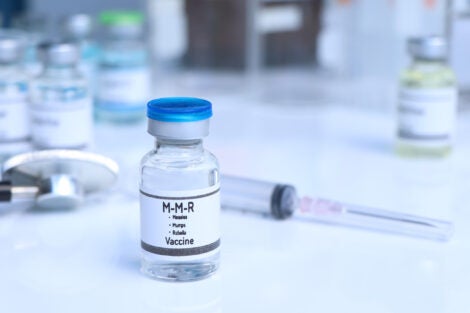March 27, 2024—On March 18, the Centers for Disease Control and Prevention issued a health alert warning clinicians and public health officials of a global rise in measles cases. Yonatan Grad, professor of immunology and infectious diseases at Harvard T.H. Chan School of Public Health, discusses the highly transmissible disease and what may be driving its resurgence.
Q: What should the public know about measles?
A: The first thing that people should know is that measles is preventable. The measles vaccine is one of our best. One dose is 93% effective and two doses are 97% effective in protecting against infection.
Second, measles is extremely contagious—one of the most contagious pathogens we know of. In a classroom of children who are not protected against measles, a child with measles will infect 12-18 others.
Third, measles can lead to severe health consequences. About 1 in 5 unvaccinated people with measles are hospitalized. About 1 in 20 get pneumonia. About 1 in 1000 get encephalitis—inflammation of the brain—which can result in intellectual disabilities. And about 1 to 3 in 1000 die, most often from measles pneumonia.
Another thing that’s not well appreciated is that measles can cause “immune amnesia,” in that it resets immunity to other diseases. When the vaccine was rolled out, there was not only a decline in measles, but also declines in other childhood infections like chickenpox. Recent work showed how measles infection depletes your antibodies, making you more susceptible to pathogens you had developed protection against. So the benefit of measles vaccination is two-fold: It protects people from measles and helps maintain protection against other childhood illnesses.

Q: Across the U.S. and around the world, we’re seeing measles cases rise. What might be driving this resurgence?
A: The key issue here is under-vaccination. To protect a community from outbreaks, about 95% of the population needs to have been vaccinated. In some low-income countries, the rates are down around 60-70%, and we’ve seen large measles outbreaks and measles-related deaths in those areas. Childhood vaccination and preventive health care was disrupted with the COVID-19 pandemic, putting these populations at even greater risk.
In the U.S., where the high rate of vaccination was a tremendous success in reducing measles, anti-vax trends have led to communities becoming more susceptible. Most of the recent U.S. cases have been related to international travel, and then those cases have sparked outbreaks—like the ones in the past few months in Philadelphia and Broward County, Florida.
Q: The drop in vaccination rates is alarming. What are some of the cultural and political drivers that are leading people to question vaccines?
A: I don’t study cultural and political drivers, so here are a few of my guesses. The level of misinformation and disinformation about vaccines and their safety seems like a huge problem. And as I referred to, the lack of access to health care and vaccines, particularly in low-income countries, is another huge problem. The drop in vaccination rates, where past successful vaccination campaigns have made once familiar diseases very rare, may also get at one of the paradoxes of public health: With a successful public health intervention, over time people forget about a disease’s consequences and come to question the need to continue investing in the intervention.
We need to identify communities and populations where vaccination rates are decreasing or are low enough to warrant concern, so we can better understand the drivers at work and effectively respond to them. We need to counter disinformation, providing forums for trusted health advisors. And we need to redouble our global commitment to providing health care—and in this case specifically, providing access to vaccines—for all.
Photos: iStock/Kittisak Kaewchalun; Kent Dayton
